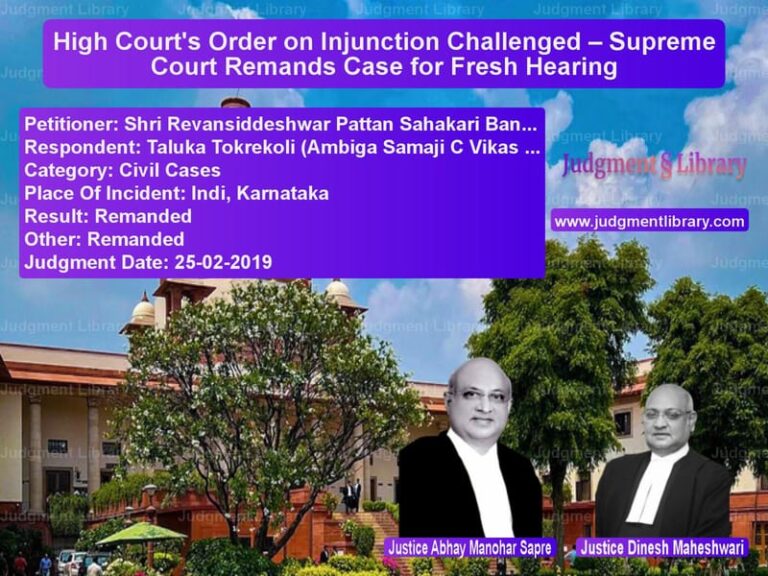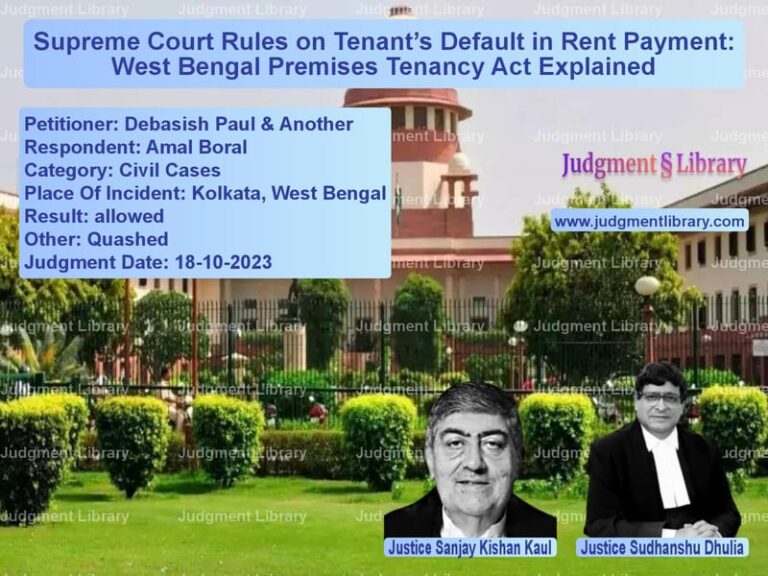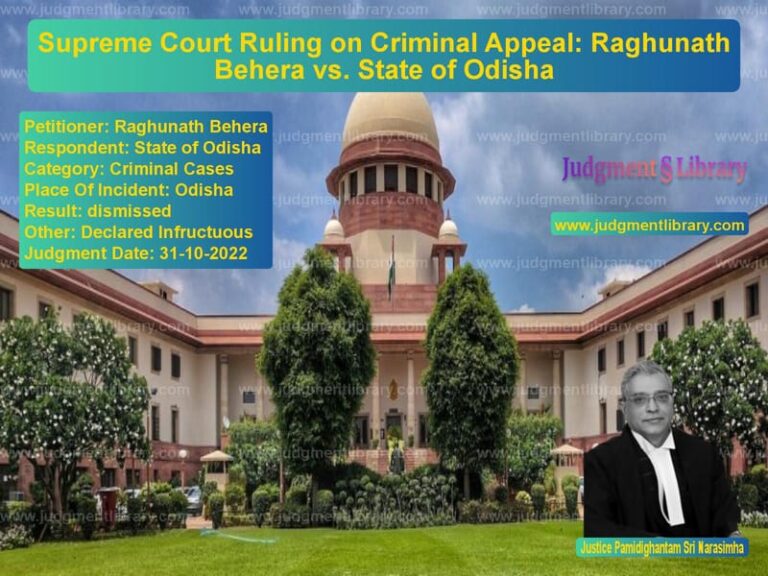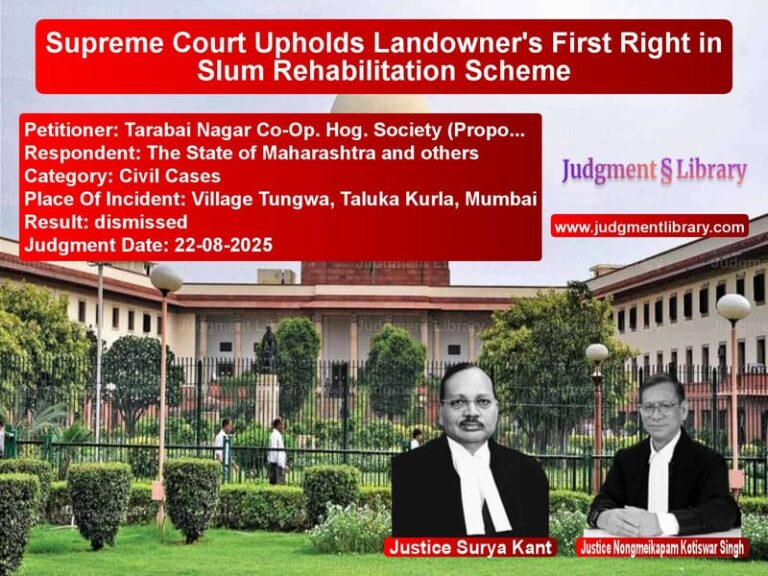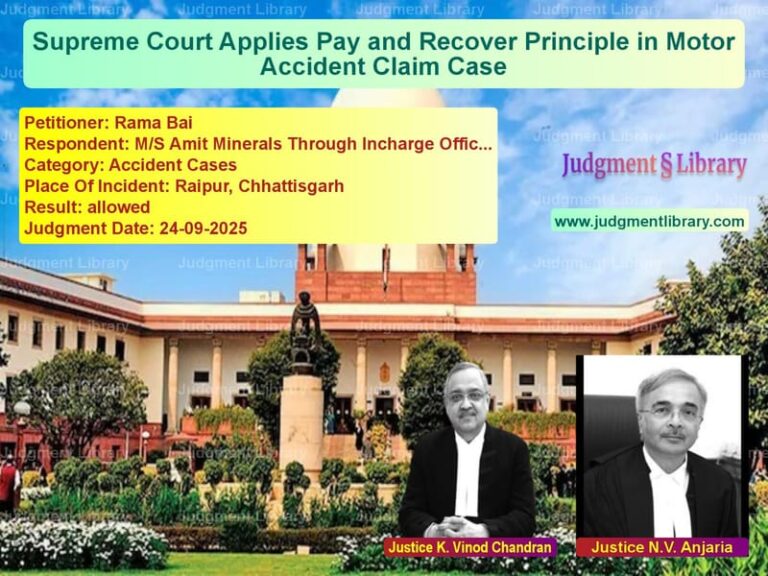Bank Loan Default and Criminal Complaint: Supreme Court Quashes FIR Against Bank Officials
The case of K. Virupaksha & Anr. v. State of Karnataka & Anr. revolves around the legal proceedings initiated against bank officials for alleged conspiracy and misconduct in a loan recovery process under the SARFAESI Act. The Supreme Court was required to determine whether criminal proceedings could be sustained against bank officials when the borrower had already exhausted legal remedies under banking laws.
The case emerged after Canara Bank classified the complainant’s loan account as a Non-Performing Asset (NPA) and proceeded with an auction to recover dues. The borrower, aggrieved by the valuation and auction process, initiated multiple legal proceedings, including a writ petition, SARFAESI appeals, and ultimately, a criminal complaint against bank officials, alleging conspiracy and financial misconduct. The Supreme Court, in its ruling, quashed the criminal proceedings, holding that banking transactions governed by SARFAESI could not be converted into criminal offenses.
Background of the Case
The complainant had taken a loan of Rs. 2.68 crore from Canara Bank in 2009 and pledged a property as collateral. The borrower defaulted on the loan, leading the bank to classify the account as an NPA on January 15, 2013. Under the Securitisation and Reconstruction of Financial Assets and Enforcement of Securities Interest Act, 2002 (SARFAESI Act), the bank issued recovery notices and took possession of the mortgaged property on March 22, 2013.
The property was initially put up for auction at a reserve price of Rs. 2.28 crore, but there were no bidders. A subsequent auction notice on December 30, 2013, reduced the reserve price to Rs. 1.10 crore. The borrower challenged the auction through various legal channels but failed to secure relief.
Key Legal Issues
- Whether bank officials could be held criminally liable for loan recovery actions taken under the SARFAESI Act.
- Whether a borrower could file a criminal complaint after exhausting civil remedies.
- Whether the FIR was an abuse of process to intimidate bank officials.
Arguments by the Petitioners (Bank Officials)
The bank officials argued that:
- Their actions were strictly in accordance with the SARFAESI Act, which governs loan recovery.
- The complainant had already challenged the auction process before the Karnataka High Court and the Debt Recovery Tribunal (DRT) and lost.
- The criminal complaint was an attempt to harass bank officials and deter them from enforcing loan recovery mechanisms.
- Section 32 of the SARFAESI Act grants immunity to bank officials acting in good faith.
Arguments by the Respondents (Borrower)
The complainant contended that:
- The auction process was manipulated, and the property was undervalued.
- Only Rs. 90 lakh of the Rs. 2.68 crore loan was disbursed, with the rest being adjusted against repayments without consent.
- Bank officials conspired with the auction purchaser to cause wrongful loss.
- Despite approaching the SARFAESI Tribunal, the complaint against bank officials was justified as fraud had been committed.
Supreme Court’s Observations
The Supreme Court analyzed the legal position regarding the invocation of criminal proceedings in disputes involving banking transactions and held:
“The SARFAESI Act is a complete code in itself, providing a structured mechanism for loan recovery and borrower remedies. Allowing criminal proceedings against bank officials would undermine the statutory framework.”
The Court referred to precedents, including State of Haryana v. Bhajan Lal (1992), which emphasized that criminal proceedings should be quashed if they are intended to abuse the legal system.
The judgment further stated:
“If every borrower is allowed to file criminal complaints against bank officials executing loan recovery, it will paralyze the banking system.”
Final Judgment
The Supreme Court quashed the criminal proceedings and ruled:
- The FIR against bank officials was an abuse of the legal process.
- The complainant had already availed and exhausted remedies under the SARFAESI Act.
- Bank officials were protected under Section 32 of the SARFAESI Act, as they acted in good faith.
Conclusion
This judgment clarifies that loan recovery under SARFAESI cannot be criminalized. Key takeaways include:
- Borrowers cannot use criminal law as a substitute for civil remedies.
- Bank officials executing statutory duties are protected from frivolous FIRs.
- Judicial review should be limited to cases of clear illegality or bad faith.
The ruling reinforces the principle that criminal law should not be misused to intimidate financial institutions and their officers.
Petitioner Name: K. Virupaksha & Anr..Respondent Name: State of Karnataka & Anr..Judgment By: Justice R. Banumathi, Justice S. Abdul Nazeer, Justice A.S. Bopanna.Place Of Incident: Hubballi, Karnataka.Judgment Date: 03-03-2020.
Don’t miss out on the full details! Download the complete judgment in PDF format below and gain valuable insights instantly!
Download Judgment: K. Virupaksha & Anr. vs State of Karnataka & Supreme Court of India Judgment Dated 03-03-2020.pdf
Direct Downlaod Judgment: Direct downlaod this Judgment
See all petitions in Fraud and Forgery
See all petitions in Bankruptcy and Insolvency
See all petitions in Debt Recovery
See all petitions in Judgment by R. Banumathi
See all petitions in Judgment by S. Abdul Nazeer
See all petitions in Judgment by A. S. Bopanna
See all petitions in allowed
See all petitions in Quashed
See all petitions in supreme court of India judgments March 2020
See all petitions in 2020 judgments
See all posts in Criminal Cases Category
See all allowed petitions in Criminal Cases Category
See all Dismissed petitions in Criminal Cases Category
See all partially allowed petitions in Criminal Cases Category


